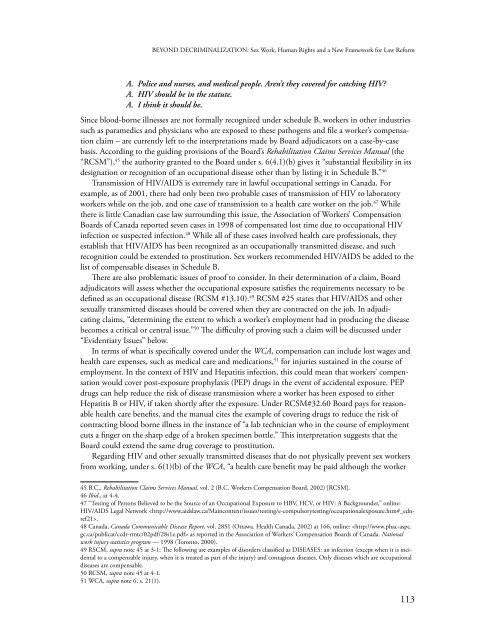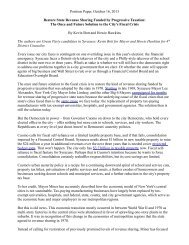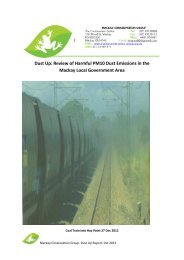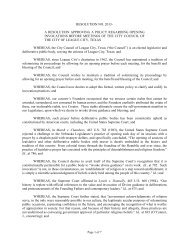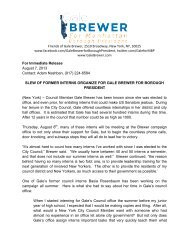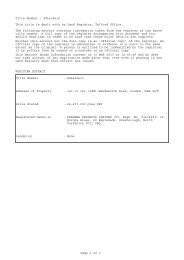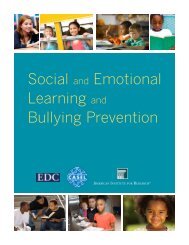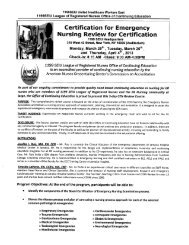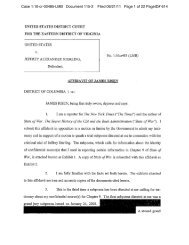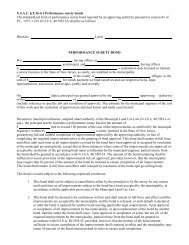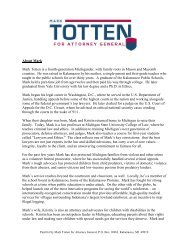PIVOT LEGAL SOCIETYUnder the WCA, <strong>work</strong>ers might also be eligible for compensation for mental stress. 40 However,compensable psychological disability must be acute, <strong>and</strong> be diagnosed by a physician or psychologist,<strong>and</strong> it must go beyond clinical depression, addiction <strong>and</strong> anxiety disorders. Such compensation istherefore rare <strong>and</strong> extremely difficult to obtain.Many sex <strong>work</strong>ers described the psychological stresses associated with their <strong>work</strong>:A. There should be a similar system with sex <strong>work</strong>. For sex trade <strong>work</strong>ers, they sufferfrom post-traumatic stress disorder. Tons of them do. I do . . . Or when they are inthe trade still. I mean, excessive nightmares, anxiety attacks. It’s all part of post traumaticstress disorder. A lot of that makes it very hard for someone to find <strong>work</strong>, like,legitimate non-sex <strong>work</strong>, <strong>work</strong>.- female off-street out-call sex <strong>work</strong>erProject participants also mentioned that employee benefits, such as <strong>work</strong>ers’ compensation, couldprovide an incentive to <strong>work</strong> for an employer, rather than <strong>work</strong> on their own:A. Yeah I would pay into that. That’s – that’s like that’s what I was saying – like the onlyreason that I would go to a house versus <strong>work</strong>ing by myself would be to get that kindof protection, would be to get a Pension. You have to pull into account, hey they wantthis legalized, they wanna help us out, they want to make this a legal thing? Thegovernment wants a piece of the pie? Fine. Tax us. Pension us. Everything else like aregular job job. It also gives you maternity leave, it also gives you paid leave, <strong>work</strong>ers’compensation, in case you get hurt on the job, god knows you could get lock jaw.- female street-level sex <strong>work</strong>ersSection 6(1) of the WCA provides compensation for occupational diseases. 41 For example, Hepatitis A<strong>and</strong> Herpes Simplex are covered at present. However, the Occupational Disease Recognition Regulation 42does not recognize HIV/AIDS as an occupational disease. Sections 6(4.1) <strong>and</strong> 6(4.2) give authority tothe Board to add to the occupational diseases set out in Schedule B of the Regulation. 43Although it is commonly believed that sex <strong>work</strong>ers are “vectors” of disease, Canadian healthresearch indicates that the majority of sex trade <strong>work</strong>ers who acquire HIV through sexual contactcontracted it through unprotected sex with a male intravenous drug user who was an intimate partner,not through a client. 44 The vast majority of sex <strong>work</strong>ers who contributed to this project reportedbeing extremely vigilant <strong>and</strong> careful about condom use on the job. Nevertheless, there may be cases ofaccidental exposure. <strong>Sex</strong> <strong>work</strong>ers suggested that the schedule should be revised to include HIV/AIDSso that <strong>work</strong>ers in all industries who may be vulnerable to HIV exposure have access to <strong>work</strong>ers’compensation:40 WCA, supra note 6, s. 5.1.41 Occupational disease means (a) a <strong>work</strong>er suffers from an occupational disease <strong>and</strong> is thereby disabled from earning full wages at the<strong>work</strong> at which the <strong>work</strong>er was employed or the death of a <strong>work</strong>er is caused by an occupational disease; <strong>and</strong> (b) the disease is due to thenature of any employment in which the <strong>work</strong>er was employed, whether under one or more employments. WCA, supra note 6, s. 6(1).42 Occupational Disease Recognition Regulation, B.C. Reg. 71/99.43 WCA, supra note 6, s. 6(4.1): The Board may, by regulation, (a) add to or delete from Schedule B a disease that, in the opinion ofthe Board, is an occupational disease, (b) add to or delete from Schedule B a process or an industry, <strong>and</strong> (c) set terms, conditions <strong>and</strong>limitations for the purposes of paragraphs (a) <strong>and</strong> (b). Section 6(4.2): Despite subsection (4.1), the Board may designate or recognizea disease as being a disease that is peculiar to or characteristic of a particular process, trade or occupation on the terms <strong>and</strong> conditions<strong>and</strong> with the limitations set by the Board.44 See, for example: K. Bastow “Prostitution <strong>and</strong> HIV/AIDS” (1995) HIV/AIDS Policy & Law <strong>New</strong>sletter 2(2), online: CanadianHIV/AIDS Legal Net<strong>work</strong> Homepage ;L. Jackson & A. Highcrest “Female Prostitutes in North America. What are their Risks of HIV Infection?” in L. Sheer, C. Hankins<strong>and</strong> L. Bennett eds., AIDS as a Gender Issue (London: Taylor <strong>and</strong> Francis, 1996); P.M. Spittal, K.J.P. Craib, E. Wood, N. Laliberte,K. Li, M.W. Tyndall, M.V. O’Shaughnessey & M.T. Schechter “Risk factors for elevated HIV incidence rates among female injectiondrug users in Vancouver” (2002) Canadian Medical Association Journal 166(7).112
BEYOND DECRIMINALIZATION: <strong>Sex</strong> Work, <strong>Human</strong> <strong>Rights</strong> <strong>and</strong> a <strong>New</strong> Frame<strong>work</strong> for Law ReformA. Police <strong>and</strong> nurses, <strong>and</strong> medical people. Aren’t they covered for catching HIV?A. HIV should be in the statute.A. I think it should be.Since blood-borne illnesses are not formally recognized under schedule B, <strong>work</strong>ers in other industriessuch as paramedics <strong>and</strong> physicians who are exposed to these pathogens <strong>and</strong> file a <strong>work</strong>er’s compensationclaim – are currently left to the interpretations made by Board adjudicators on a case-by-casebasis. According to the guiding provisions of the Board’s Rehabilitation Claims Services Manual (the“RCSM”), 45 the authority granted to the Board under s. 6(4.1)(b) gives it “substantial flexibility in itsdesignation or recognition of an occupational disease other than by listing it in Schedule B.” 46Transmission of HIV/AIDS is extremely rare in lawful occupational settings in Canada. Forexample, as of 2001, there had only been two probable cases of transmission of HIV to laboratory<strong>work</strong>ers while on the job, <strong>and</strong> one case of transmission to a health care <strong>work</strong>er on the job. 47 Whilethere is little Canadian case law surrounding this issue, the Association of Workers’ CompensationBoards of Canada reported seven cases in 1998 of compensated lost time due to occupational HIVinfection or suspected infection. 48 While all of these cases involved health care professionals, theyestablish that HIV/AIDS has been recognized as an occupationally transmitted disease, <strong>and</strong> suchrecognition could be extended to prostitution. <strong>Sex</strong> <strong>work</strong>ers recommended HIV/AIDS be added to thelist of compensable diseases in Schedule B.There are also problematic issues of proof to consider. In their determination of a claim, Boardadjudicators will assess whether the occupational exposure satisfies the requirements necessary to bedefined as an occupational disease (RCSM #13.10). 49 RCSM #25 states that HIV/AIDS <strong>and</strong> othersexually transmitted diseases should be covered when they are contracted on the job. In adjudicatingclaims, “determining the extent to which a <strong>work</strong>er’s employment had in producing the diseasebecomes a critical or central issue.” 50 The difficulty of proving such a claim will be discussed under“Evidentiary Issues” below.In terms of what is specifically covered under the WCA, compensation can include lost wages <strong>and</strong>health care expenses, such as medical care <strong>and</strong> medications, 51 for injuries sustained in the course ofemployment. In the context of HIV <strong>and</strong> Hepatitis infection, this could mean that <strong>work</strong>ers’ compensationwould cover post-exposure prophylaxis (PEP) drugs in the event of accidental exposure. PEPdrugs can help reduce the risk of disease transmission where a <strong>work</strong>er has been exposed to eitherHepatitis B or HIV, if taken shortly after the exposure. Under RCSM#32.60 Board pays for reasonablehealth care benefits, <strong>and</strong> the manual cites the example of covering drugs to reduce the risk ofcontracting blood borne illness in the instance of “a lab technician who in the course of employmentcuts a finger on the sharp edge of a broken specimen bottle.” This interpretation suggests that theBoard could extend the same drug coverage to prostitution.Regarding HIV <strong>and</strong> other sexually transmitted diseases that do not physically prevent sex <strong>work</strong>ersfrom <strong>work</strong>ing, under s. 6(1)(b) of the WCA, “a health care benefit may be paid although the <strong>work</strong>er45 B.C., Rehabilitation Claims Services Manual, vol. 2 (B.C. Workers Compensation Board, 2002) [RCSM].46 Ibid., at 4-4.47 “Testing of Persons Believed to be the Source of an Occupational Exposure to HBV, HCV, or HIV: A Backgrounder,” online:HIV/AIDS Legal Net<strong>work</strong> .48 Canada, Canada Communicable Disease Report, vol. 28S1 (Ottawa. Health Canada, 2002) at 166, online: as reported in the Association of Workers’ Compensation Boards of Canada. National<strong>work</strong> injury statistics program — 1998 (Toronto, 2000).49 RSCM, supra note 45 at 3-1: The following are examples of disorders classified as DISEASES: an infection (except when it is incidentalto a compensable injury, when it is treated as part of the injury) <strong>and</strong> contagious diseases. Only diseases which are occupationaldiseases are compensable.50 RCSM, supra note 45 at 4-1.51 WCA, supra note 6, s. 21(1).113
- Page 4:
PIVOT LEGAL SOCIETYPart 2: Municipa
- Page 21 and 22:
BEYOND DECRIMINALIZATION: Sex Work,
- Page 23 and 24:
BEYOND DECRIMINALIZATION: Sex Work,
- Page 25 and 26:
BEYOND DECRIMINALIZATION: Sex Work,
- Page 27 and 28:
BEYOND DECRIMINALIZATION: Sex Work,
- Page 29 and 30:
BEYOND DECRIMINALIZATION: Sex Work,
- Page 31 and 32:
BEYOND DECRIMINALIZATION: Sex Work,
- Page 33 and 34:
BEYOND DECRIMINALIZATION: Sex Work,
- Page 35 and 36:
BEYOND DECRIMINALIZATION: Sex Work,
- Page 37 and 38:
BEYOND DECRIMINALIZATION: Sex Work,
- Page 39 and 40:
BEYOND DECRIMINALIZATION: Sex Work,
- Page 41 and 42:
BEYOND DECRIMINALIZATION: Sex Work,
- Page 43 and 44:
BEYOND DECRIMINALIZATION: Sex Work,
- Page 45 and 46:
BEYOND DECRIMINALIZATION: Sex Work,
- Page 47 and 48:
BEYOND DECRIMINALIZATION: Sex Work,
- Page 49 and 50:
BEYOND DECRIMINALIZATION: Sex Work,
- Page 51 and 52:
BEYOND DECRIMINALIZATION: Sex Work,
- Page 53 and 54:
BEYOND DECRIMINALIZATION: Sex Work,
- Page 55 and 56:
BEYOND DECRIMINALIZATION: Sex Work,
- Page 57 and 58:
BEYOND DECRIMINALIZATION: Sex Work,
- Page 59 and 60:
BEYOND DECRIMINALIZATION: Sex Work,
- Page 61 and 62: BEYOND DECRIMINALIZATION: Sex Work,
- Page 63 and 64: BEYOND DECRIMINALIZATION: Sex Work,
- Page 65 and 66: BEYOND DECRIMINALIZATION: Sex Work,
- Page 67 and 68: BEYOND DECRIMINALIZATION: Sex Work,
- Page 69 and 70: BEYOND DECRIMINALIZATION: Sex Work,
- Page 71 and 72: BEYOND DECRIMINALIZATION: Sex Work,
- Page 73 and 74: BEYOND DECRIMINALIZATION: Sex Work,
- Page 75 and 76: BEYOND DECRIMINALIZATION: Sex Work,
- Page 77 and 78: BEYOND DECRIMINALIZATION: Sex Work,
- Page 79 and 80: BEYOND DECRIMINALIZATION: Sex Work,
- Page 81 and 82: BEYOND DECRIMINALIZATION: Sex Work,
- Page 83 and 84: BEYOND DECRIMINALIZATION: Sex Work,
- Page 85 and 86: BEYOND DECRIMINALIZATION: Sex Work,
- Page 87 and 88: BEYOND DECRIMINALIZATION: Sex Work,
- Page 89 and 90: BEYOND DECRIMINALIZATION: Sex Work,
- Page 91 and 92: BEYOND DECRIMINALIZATION: Sex Work,
- Page 93 and 94: BEYOND DECRIMINALIZATION: Sex Work,
- Page 95 and 96: BEYOND DECRIMINALIZATION: Sex Work,
- Page 97 and 98: BEYOND DECRIMINALIZATION: Sex Work,
- Page 99 and 100: BEYOND DECRIMINALIZATION: Sex Work,
- Page 101 and 102: BEYOND DECRIMINALIZATION: Sex Work,
- Page 103 and 104: BEYOND DECRIMINALIZATION: Sex Work,
- Page 105 and 106: BEYOND DECRIMINALIZATION: Sex Work,
- Page 107 and 108: BEYOND DECRIMINALIZATION: Sex Work,
- Page 109 and 110: BEYOND DECRIMINALIZATION: Sex Work,
- Page 111: BEYOND DECRIMINALIZATION: Sex Work,
- Page 115 and 116: BEYOND DECRIMINALIZATION: Sex Work,
- Page 117 and 118: BEYOND DECRIMINALIZATION: Sex Work,
- Page 119 and 120: BEYOND DECRIMINALIZATION: Sex Work,
- Page 121 and 122: BEYOND DECRIMINALIZATION: Sex Work,
- Page 123 and 124: BEYOND DECRIMINALIZATION: Sex Work,
- Page 125 and 126: BEYOND DECRIMINALIZATION: Sex Work,
- Page 127 and 128: BEYOND DECRIMINALIZATION: Sex Work,
- Page 129 and 130: BEYOND DECRIMINALIZATION: Sex Work,
- Page 131 and 132: BEYOND DECRIMINALIZATION: Sex Work,
- Page 133 and 134: BEYOND DECRIMINALIZATION: Sex Work,
- Page 135 and 136: BEYOND DECRIMINALIZATION: Sex Work,
- Page 137 and 138: BEYOND DECRIMINALIZATION: Sex Work,
- Page 139 and 140: BEYOND DECRIMINALIZATION: Sex Work,
- Page 141 and 142: BEYOND DECRIMINALIZATION: Sex Work,
- Page 143 and 144: BEYOND DECRIMINALIZATION: Sex Work,
- Page 145 and 146: BEYOND DECRIMINALIZATION: Sex Work,
- Page 147 and 148: BEYOND DECRIMINALIZATION: Sex Work,
- Page 149 and 150: BEYOND DECRIMINALIZATION: Sex Work,
- Page 151 and 152: BEYOND DECRIMINALIZATION: Sex Work,
- Page 153 and 154: BEYOND DECRIMINALIZATION: Sex Work,
- Page 155 and 156: BEYOND DECRIMINALIZATION: Sex Work,
- Page 157 and 158: BEYOND DECRIMINALIZATION: Sex Work,
- Page 159 and 160: BEYOND DECRIMINALIZATION: Sex Work,
- Page 161 and 162: BEYOND DECRIMINALIZATION: Sex Work,
- Page 163 and 164:
BEYOND DECRIMINALIZATION: Sex Work,
- Page 165 and 166:
BEYOND DECRIMINALIZATION: Sex Work,
- Page 167 and 168:
BEYOND DECRIMINALIZATION: Sex Work,
- Page 169 and 170:
BEYOND DECRIMINALIZATION: Sex Work,
- Page 171 and 172:
BEYOND DECRIMINALIZATION: Sex Work,
- Page 173 and 174:
BEYOND DECRIMINALIZATION: Sex Work,
- Page 175 and 176:
BEYOND DECRIMINALIZATION: Sex Work,
- Page 177 and 178:
BEYOND DECRIMINALIZATION: Sex Work,
- Page 179 and 180:
BEYOND DECRIMINALIZATION: Sex Work,
- Page 181 and 182:
BEYOND DECRIMINALIZATION: Sex Work,
- Page 183 and 184:
BEYOND DECRIMINALIZATION: Sex Work,
- Page 185 and 186:
BEYOND DECRIMINALIZATION: Sex Work,
- Page 187 and 188:
BEYOND DECRIMINALIZATION: Sex Work,
- Page 189 and 190:
BEYOND DECRIMINALIZATION: Sex Work,
- Page 191 and 192:
BEYOND DECRIMINALIZATION: Sex Work,
- Page 193 and 194:
BEYOND DECRIMINALIZATION: Sex Work,
- Page 195 and 196:
BEYOND DECRIMINALIZATION: Sex Work,
- Page 197 and 198:
BEYOND DECRIMINALIZATION: Sex Work,
- Page 199 and 200:
BEYOND DECRIMINALIZATION: Sex Work,
- Page 201 and 202:
BEYOND DECRIMINALIZATION: Sex Work,
- Page 203 and 204:
BEYOND DECRIMINALIZATION: Sex Work,
- Page 205 and 206:
BEYOND DECRIMINALIZATION: Sex Work,
- Page 207 and 208:
BEYOND DECRIMINALIZATION: Sex Work,
- Page 209 and 210:
BEYOND DECRIMINALIZATION: Sex Work,
- Page 211 and 212:
BEYOND DECRIMINALIZATION: Sex Work,
- Page 213 and 214:
BEYOND DECRIMINALIZATION: Sex Work,
- Page 215 and 216:
BEYOND DECRIMINALIZATION: Sex Work,
- Page 217 and 218:
BEYOND DECRIMINALIZATION: Sex Work,
- Page 219 and 220:
BEYOND DECRIMINALIZATION: Sex Work,
- Page 221 and 222:
BEYOND DECRIMINALIZATION: Sex Work,
- Page 223 and 224:
BEYOND DECRIMINALIZATION: Sex Work,
- Page 225 and 226:
BEYOND DECRIMINALIZATION: Sex Work,
- Page 227 and 228:
BEYOND DECRIMINALIZATION: Sex Work,
- Page 229:
BEYOND DECRIMINALIZATION: Sex Work,


